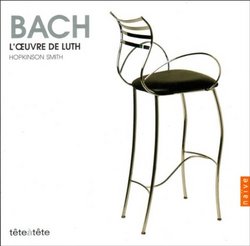| All Artists: Johann Sebastian Bach Title: L'Oeuvre de Luth Members Wishing: 0 Total Copies: 0 Label: Astree Release Date: 10/8/2002 Genre: Classical Styles: Chamber Music, Historical Periods, Baroque (c.1600-1750), Classical (c.1770-1830), Instruments, Strings Number of Discs: 2 SwapaCD Credits: 2 UPC: 822186030004 |
Search - Johann Sebastian Bach :: L'Oeuvre de Luth
CD Details |
CD ReviewsJust amazing! gonzalo | Santiago Chile | 10/29/2002 (5 out of 5 stars) "I just bought this cd from my local cd store, and i was blown away! The music is just great. The sound of the recording is perfect, and the way this guy plays.... The pieces are a bit slower than i was used to in the gould, williams or bream recordings, but the tempo fits great, the record has a calm feel to it that serves very well the kind of spiritual nature of bach's music, and it gives time to every voice and sound to be perceived and enjoyed. But don't get it wrong, the interpreter gives us quite a bit of musical and emotional range here... I could go on and on, but let me just say that if it only were for the Praeludium Fugue und Allegro BWV998 this set would be worth the price... If you like bach on guitar i think you sould have this one to, no doubt!" A less stressful Bach Kurt Krueckeberg | Plano TX | 03/16/2005 (5 out of 5 stars) "I throughly enjoyed these versions of Bach's Lute suites. They seem more natural on Lute. If you want a guitar version, check out Sharon Ibsen's recording, Bach: Complete Lute Suites. I have both. I find the Hopkins Smith recording are a bit more sedate, but also more relaxing." Musically excellent, sonically deficient Harvey S. Liszt | Charlottesville, VA USA | 01/25/2009 (3 out of 5 stars) "Smith is a wonderful musician and his interpretations are impeccable. But with the exception of the 2nd lute suite BWV997 which opens the 2nd disk, there is just no bass in the recording and even the lower midrange is effaced. So the fat plucked bass sonority that says "baroque lute" is missing and the bass lines and lower midrange voicings are lost. A shame."
|

